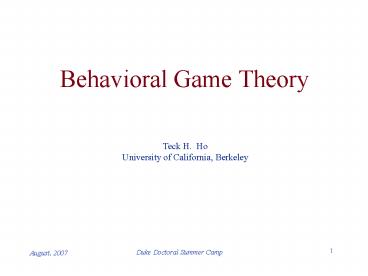Behavioral Game Theory
1 / 11
Title:
Behavioral Game Theory
Description:
Duke Doctoral Summer Camp. Dual Pillars of Economic Analysis. Specification of Utility ... Duke Doctoral Summer Camp. Motivation: Utility Specification ... – PowerPoint PPT presentation
Number of Views:62
Avg rating:3.0/5.0
Title: Behavioral Game Theory
1
Behavioral Game Theory
Teck H. Ho University of California, Berkeley
2
Outline
- Motivation
- Mutual Consistency CH Model
- Noisy Best-Response QRE Model
- Instant Convergence EWA Learning
3
Dual Pillars of Economic Analysis
- Specification of Utility
- Only final allocation matters
- Self-interest
- Exponential discounting
- Solution Method
- Nash equilibrium and its refinements (instant
equilibration)
4
Motivation Utility Specification
- Reference point matters People care both about
the final allocation as well as the changes with
respect to a target level - Fairness John cares about Marys payoff. In
addition, the marginal utility of John with
respect to an increase in Marys income increases
when Mary is kind to John and decreases when Mary
is unkind - Hyperbolic discounting People are impatient and
prefer instant gratification
5
Motivation Solution Method
- Nash equilibrium and its refinements Dominant
theories in marketing for predicting behaviors in
non-cooperative games. - Subjects do not play Nash in many one-shot games.
- Behaviors do not converge to Nash with repeated
interactions in some games. - Multiplicity problem (e.g., coordination games).
- Anything go in infinitely repeated games.
- Modeling subject heterogeneity really matters in
games.
6
Bounded Rationality in Markets Revised Utility
Function
Ho, Lim, and Camerer (JMR, 2006)
7
Bounded Rationality in Markets Alternative
Solution Methods
8
Standard Assumptions in Equilibrium Analysis
9
Modeling Philosophy
- Simple (Economics)
- General (Economics)
- Precise (Economics)
- Empirically disciplined (Psychology)
- the empirical background of economic science is
definitely inadequate...it would have been absurd
in physics to expect Kepler and Newton without
Tycho Brahe (von Neumann Morgenstern 44) - Without having a broad set of facts on which to
theorize, there is a certain danger of spending
too much time on models that are mathematically
elegant, yet have little connection to actual
behavior. At present our empirical knowledge is
inadequate... (Eric Van Damme 95)
10
Application Strategic IQ
http//128.32.75.8/siq/default1.asp
- A battery of 30 "well-known" games
- Measure a subject's strategic IQ by how much
money they make (matched against a defined pool
of subjects) - Measure how a Nash player performs
- Benchmark other types of players (e.g., CH and
QRE) against Nash
11
Outline
- Motivation
- Mutual Consistency CH Model
- Noisy Best-Response QRE Model
- Instant Convergence EWA Learning






![READ[PDF] Theory of Games and Economic Behavior PowerPoint PPT Presentation](https://s3.amazonaws.com/images.powershow.com/10100654.th0.jpg?_=20240816011)
























